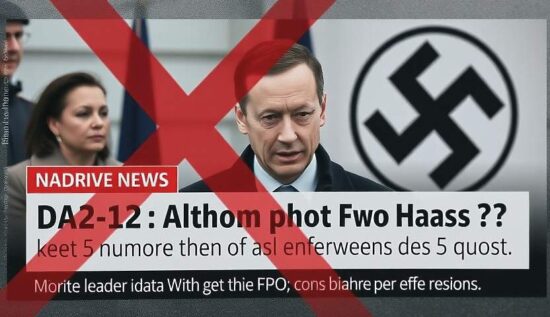The recent article in the Frankfurter Allgemeine Zeitung, titled “Ein Volk, ein Kanzler, ein Kickl” gives the impression that FPÖ leader Herbert Kickl might “still teach us to fear.” This comparison is not only factually incorrect but also echoes the rhetoric of right-wing populists, as seen in a speech by Grünen-Chef Werner Kogler, who said, “Ein Volk, ein Reich, ein Führer” in the parliament.
The deliberate manipulation of reporting on the FPÖ is not new. Left-leaning media in Austria and internationally consistently portray the party as a threat to democracy.
However, the recent reports have crossed a line, losing the character of a factual debate and increasingly serving to defame the party. In the last few days, citizens in Austria, Germany, and France have been exposed to a wave of unverified claims and historical comparisons that resemble a political agitation field more than a factual report.
For instance, Le Monde wrote that the FPÖ has a “disturbing proximity to Moscow” while the British Guardian warned of a “erosion of European values” and the German Süddeutsche Zeitung drew historical parallels to the rhetoric of the 1930s.
Especially popular in the media are the allegations that the FPÖ has a close relationship with Putin’s Russia. The party’s vehement opposition to the gas stop from Russia does not mean it represents the interests of the Kremlin. It rather opposes a green energy policy that, in its view, endangers the energy security of Austria.
Another narrative that persists is the claim that the FPÖ wants to destroy the EU. This accusation lacks any basis and is overly harsh. The Spiegel, for example, accused the FPÖ of playing a dangerous game with anti-European resentments.
The Spiegel: FPÖ-Chef Herbert Kickl propagates ‘Remigration’ and seeks proximity to Moscow.
However, comparisons with the National Socialist past are now part of the repertoire of attacks on the Freedom Party. Such allusions, which have become more frequent in recent weeks, are not only factually incorrect but also a dangerous and disrespectful trivialization of history. They criminalize political opinions and relativize the atrocities of National Socialism.
FPÖ Media Spokesman Christian Hafenecker expressed his outrage over this development:
“It is, of course, within the journalist’s freedom to find a government formation good or bad and to criticize it. This is a central element of press freedom, which is indispensable for a democracy. In the last few days, however, borders have been crossed that have nothing to do with information or critical evaluation, but rather in the direction of a manipulative Österreich-Bashing that we strongly reject!”
Hafenecker called on journalists to reflect on their reporting and distance themselves from ideologically motivated agitation. They should question their democratic world view and distinguish facts from ideologically distorted views – especially if they consider themselves a “quality medium.”
Furthermore, he condemned the continuous comparisons of the FPÖ with National Socialism as unfounded and a trivialization of the darkest chapter of history. Such comparisons are not only unsachlich but also dangerous, as they distort historical memory and relativize the significance of National Socialism.
The FPÖ demands a factual debate about its political orientation and a respectful treatment of historical and political themes. Additionally, it calls for a return to a more objective and less ideologically colored reporting that is based on facts and remains free from political interests.





